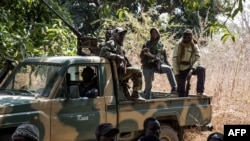Some rebels involved in one of Africa’s longest-running separatist conflicts have agreed to lay down their arms.
The Movement of Democratic Forces of Casamance and Senegal's government signed a peace deal Thursday in neighboring Guinea-Bissau.
Separatist leader Cesar Atoute Badiate and a delegate from Senegalese President Macky Sall’s administration signed the document. Badiate leads one of several rebel factions that operate in Casamance. The other groups were not involved in the deal.
Seydi Gassama, director of Amnesty International Senegal, said Badiate’s group, which operates along the Guinea-Bissau border, is weak and poses the smallest threat to stability in the region. Those along the Gambian border are much more aggressive, he said.
"The negotiations must expand to include these factions so that a peace deal can be quickly signed with all the factions and peace can be established throughout all of Casamance,” Gassama said.
Sall had made “achieving peace” in Casamance a priority for his second term in office. But the announcement of the accord came too late to have an impact on last week’s legislative elections.
The conflict in Casamance has spanned 40 years and claimed thousands of lives. The most recent flare-up began in January and involved the killing of four Senegalese soldiers. The Senegalese army launched an offensive in March aimed at dismantling separatist bases along the Gambian border. Thousands fled from their villages to seek safety in tiny Gambia.
Dame Beye, leader of several civil society organizations in Casamance, said rebels have agreed to cease-fires in the past, but those deals would hold for only one or two months. This is the first time a faction has agreed to lay down its arms, he said.
“We are very optimistic, because it was a huge amount of work over several years,” Beye said. “The war has lasted too long. It’s been 40 years of conflict and they never got their independence.”
Senegal’s Casamance region is geographically distinct from the rest of the country as it lies on the other side of Gambia. It practices different religious, ethnic and linguistic traditions. It also differs historically as it was colonized by the Portuguese, whereas the rest of Senegal was colonized by the French.
The rebels are suspected of trafficking cannabis and rosewood, which is exported to China, in order to fund their separatist movement.




